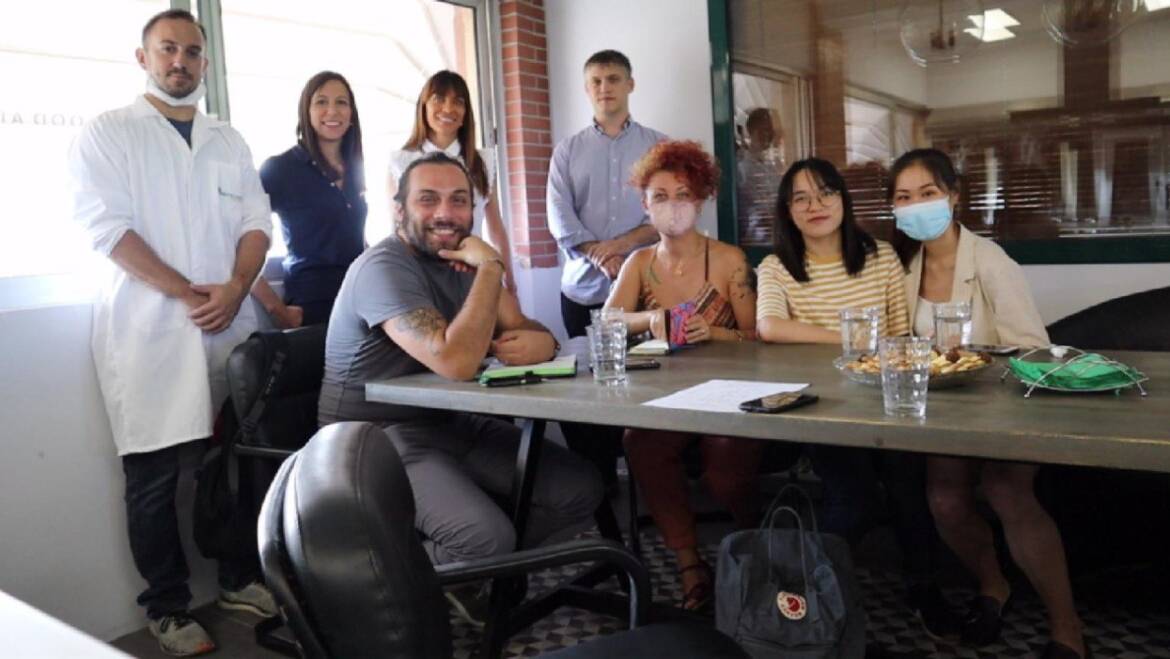Secondments are not just confined to the time that is spent on them but also involve post-activities such as the dissemination of findings to the public and the production of academic outputs. The team of 5 secondees sent to Nefeloudis Food Additives in the period of September to December 2020, Meletios Bimpizas from the University of Sheffield (Sheffield, UK) and Remo Santagata, Serena Kaiser, Yanxin Liu, and Yanfeng Lyu from the University of Parthenope (Naples, Italy), report on the follow-up activities that took place after the end of their secondment.
16 February: ProCEedS mid-term meeting
On February 16 and 17, 2021, the ProCEedS mid-term review meeting with the EU Project Officer took place online. Convening all consortium members, the aim of this meeting was to report on the progress that had been made and present a series of case studies corresponding to the research that had been undertaken in the secondments, which had either finished or were towards their end. Our team had the chance to share with the consortium the preliminary findings in the form of a short, 10-minute presentation. Starting with an introduction of each team member and his/her role and contribution to the stages undertaken in the research process, a summary of the company’s operations was provided along with an overview of its production process – which was also the focal point of the life-cycle assessment (LCA), for assessing its burdens. LCA results showcased the low local environmental impact associated with the company’s production process, mainly accredited to the simplicity and low energy consumption of involved process steps. Environmental impact variations across product categories were related to the quantities produced and the properties of raw materials used. Findings were also analysed from a social perspective through a comparison between the company’s revenue and national GDP, as well as other factors pertaining to the company’s impact on the local community and territory. Analysis was extended to the different reuse practices regarding remanufacturing, repackaging, and redistribution of surpluses that the company has adopted in an effort to minimise surpluses. Subsequently, waste hotspots were identified and future research directions were proposed to resolve identified issues. The next day, a private meeting between the EU Project Officer and all early stage researchers (ESRs) took place online. There, we had the chance to share our experiences from the secondments we joined and talk about the next steps we are planning to take with reference to the dissemination of research and publications in development.
We all agreed that:
“Secondments pose a great opportunity, especially for early stage researchers, not only for fostering our career development, but also for seeing first hand how industry actually works and what is the impact we can actually have on them through close collaboration”
23 March: Sheffield University Management School – OMDS research event
As part of the dissemination activities, ESR Meletios Bimpizas from the University of Sheffield, Management School was encouraged to present to his division – Operations Management and Decision Sciences (OMDS) – the findings from his 4-month secondment to TN in Thessaloniki.
Using as a base the presentation we delivered in mid-February to the ProCEedS mid-term review meetings, I leveraged the amount of time I had at my disposal (30 minutes) in order to further expand on the LCA results and emphasise on the theoretical contribution of the findings. With regard to LCA, attention was placed on the two final product categories that accounted for the greatest impact value, drawing upon the correlation between their ingredient properties and the impact categories that the analysis was based on. Given my expertise, emphasis was placed on implemented circular economy reuse practices and the opportunities that are presented to the company in order to further minimise surpluses and prevent the generation of waste. The presentation concluded with some theoretical considerations that occured with respect to the importance of the often overlooked value retention option of reduce, towards the transition to a circular economy.
The opportunity to present these findings to my department, to an audience of academics working in the field of supply chain management, was very important due to the feedback I received and thus the chance to improve certain aspects related to the paper we are preparing along with the rest of the team of secondees.
Work in progress: Paper intended for submission
Currently, we are combining all the feedback we received from both our presentation to the EU Project Officer as well as Meletios’ presentation to his department and we are putting together a paper that we are planning to submit in the following weeks. Sharing the same sentiment, we look forward to seeing our efforts combined together to a published paper. While developing it, one thing which seems very interesting, among the main traits of the article, is its multidisciplinary approach: the different perspectives, among which there is a social reading of LCA results, give the work a wide stand point and a broadly based possibility to be used as a tool for less virtuous firms to be improved.

